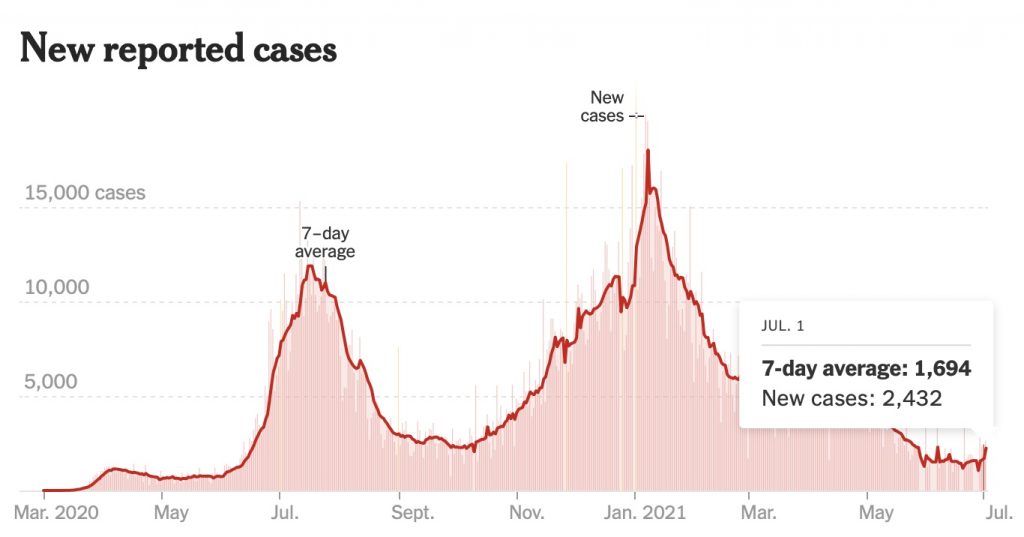
Top stories: DeSantis wins cruise ship battle with CDC; ACLU wins in challenge to contribution cap on political committees proposing constitutional amendments; Florida’s Supervisors of Elections question new voting law.
In this post, I’ll recap important news since my last post on June 10 and other highlights of the month. But first, the latest on the coronavirus in Florida.
Coronavirus Update
Florida’s pandemic-related state of emergency expired on June 26. On July 1, all local coronavirus restrictions and mandates that had been suspended in May permanently ended. (The Capitolist)
Effective June 27, eligible Floridians stopped receiving the supplemental $300 weekly Pandemic Unemployment Assistance benefit. (CBS Miami) Gov. DeSantis had officially announced that the state would withdraw from the federal program in May.
New Reported Cases
May 28 was the last day Florida reported the daily number of cases, deaths, and vaccinations in the state. It was the first among the nation’s eight most populous states — and possibly the only one in the country — that doesn’t provide daily information on the state of the pandemic. (Palm Beach Post)
That said, here’s the latest data on new reported cases in Florida:

Vaccinations
According to the NYTimes on July 3, Forty-six percent of Florida residents are now fully vaccinated, and 54 percent have had at least one dose. (NYTimes)
Florida’s figures are comparable to the nation as a whole, in which 47 percent of residents are fully vaccinated, and 55 percent have had at least one dose. (NYTimes)
By age group, 90 percent of Florida residents age 65 and older and 65 percent of those age 18 and older have had at least one shot of the vaccine. (NYTimes)
Gov. DeSantis’ executive order against vaccine mandates prohibits businesses from requiring patrons or customers from providing proof of vaccination but neither the order nor federal regulations prohibit employers from requiring vaccinations of employees. Yet, Florida hospitals do not require and often aren’t even aware of, staff COVID-19 vaccinations. (The News-Press)
The Cruise Ship Battle
A federal judge ruled for Florida in a lawsuit challenging a U.S. Centers for Disease Control and Prevention order making it difficult for cruise ships to resume sailing due to the coronavirus pandemic. A preliminary injunction the judge granted on June 18 prevents the CDC from enforcing the order pending further legal action on a broader Florida lawsuit. The judge delayed the effect of the order until July 18 and ordered both sides to return to mediation to attempt to work out a full solution. (Associated Press)
The Mask Battle
Local mask mandates drew a series of legal challenges across the state last year, with the Alachua County and Palm Beach County cases drawing conflicting appellate-court decisions. For now, masks are off In Florida, but legal wrangling continues. (News Service of Florida via WLRN)
Closing Out the 2021 Legislative Session
This month, Gov. DeSantis completed the process of approving or vetoing the 273 bills passed in the 2021 legislative session. In all, he approved 267 bills, vetoed 5 bills, and approved after line-item vetoes one bill, the budget.
In prior month recaps, we reported on many of the more significant bills passed. Three bills we did not report on previously are a trio of education bills that “boost the state’s civics curriculum and protect intellectual diversity.” (Florida Politics; News Release)
One measure prevents colleges and universities from shielding students from political speech, an attempt to crack down on liberal “indoctrination” on campuses. The measure also surveys professors to track faculty’s political leanings. The two other bills address civics curricula, including teaching students about the “evils of communism and totalitarianism.” The bill signings followed a push by DeSantis and conservatives nationwide against critical race theory. (Florida Politics)
For more on these new education laws, see Five things to know about Florida’s new ‘intellectual diversity’ law. (Tampa Bay Times).
Also this month, DeSantis signed laws intended to create easier access to non-college career tracks in Florida. A totally revamped workforce program is expected to create a more efficient pipeline from the classroom to the workplace by streamlining state career resources. (Florida Politics)
The Governor’s Vetoes
Last month we wrote about the vetoes of a $1 billion emergency fund (SB 1892) and line-item vetoes of $54 million in local projects, $2 million to increase access to long-acting reversible contraception for low-income girls and women, and $900,000 in LBGT support programs.
This month, the Governor vetoed:
- a bill that would have ended Florida’s no-fault auto insurance system(SB 54; Florida Politics);
- a high school “civics literacy education” bill (SB 146; Newsweek); and
- a juvenile diversion program expunction bill that would have erased the criminal records for tens of thousands of juveniles after completing a behavioral program, and a companion public records exemption bill (SB 274 and SB 166; Miami Herald and Tallahassee Democrat)
SOEs Question Florida’s New Elections Law
Controversial changes to Florida’s voting laws were a key topic at the annual conference of Florida’s 67 Supervisor of Elections this month. Gov. DeSantis and the Florida Legislature were criticized for their passage of Senate Bill 90, which imposes new restrictions on voting by mail, the use of drop boxes, and voter registration efforts. (WFSU Public Media)
Many unanswered questions and several outstanding legal challenges could add confusion in upcoming elections, supervisors said. (Tampa Bay Times)
Challenges to Florida Laws
Last month, we wrote about court challenges to Florida laws that restrict voting, combat “public disorder,” limit contributions to political committees backing ballot initiatives, ban transgender girls from playing in school sports designed for females, and stop censorship of Big Tech. (NYTimes, Miami Herald, NBC News, more)
Each of the “well-funded” lawsuits is defended by the office of Florida Attorney General Ashley Moody. (CBS 12)
Here is an update on some of these challenges and challenges to some laws passed in prior years.
Voting
Two more groups sued the state over the new voting law, adding to a growing chorus of voter rights advocates who say the rules could keep some people from casting ballots. The Fair Elections Center and the Southern Poverty Law Center on behalf of Head Count and the Harriet Tubman Freedom Fighters are the latest plaintiffs. They argue that the new law foments distrust against civic organizations that work to register voters by suggesting that residents use the government’s website instead. (Associated Press via News4Jax.com)
Amendment Contribution Cap
Attorney General Ashley Moody filed a motion to dismiss the American Civil Liberties Union of Florida’s request for a preliminary injunction against implementing the contribution cap. The state maintains the cap is necessary to ensure amendment drives aren’t only funded by deep-pocketed special interests from out-of-state. (The Center Square | Florida)
A federal judge denied Moody’s motion, saying the law runs afoul of the First Amendment. The ACLU and three political committees that challenged the cap are trying to get three voting-related proposed amendments on the 2022 ballot. (Orlando Sentinel; News Service of Florida via WUSF)
Big Tech
In another rejection of a DeSantis’ priority, a federal judge blocked the new law that seeks to prevent large social media platforms from banning political candidates from their sites and to require companies to publish standards about issues such as banning users or blocking their content and apply them consistently.
The law was “an effort to rein in social-media providers deemed too large and too liberal,” the judge wrote. “Balancing the exchange of ideas among private speakers is not a legitimate government interest.” (News Service of Florida via Tampa Bay Times)
Guns
A federal judge upheld a 2018 Florida law that prevents people under age 21 from buying guns, while saying the case “falls squarely in the middle of a constitutional no man’s land.” The ruling came more than three years after the Republican-controlled Legislature and then-Gov. Rick Scott rushed to approve the restriction following a massacre at the Marjory Stoneman Douglas High School in Parkland, FL, that killed 17 people. (Tampa Bay Times)
Gov. DeSantis in the News
DeSantis Sends Law Enforcement to Southern Border
Gov. DeSantis is one of several Republican governors deploying state law enforcement officials to the US-Mexico border. The deployments are in response to requests from Republican governors Doug Ducey of Arizona and Greg Abbott of Texas in a letter to the nation’s governors earlier this month. (CNN)
DeSantis called the “catastrophe at the southern border under the Biden administration” a “national security crisis” that “we must get under control.” (News Release)
Who will pay for the deployment is a “point of discussion,” the Governor said. (Pensacola News Journal)
DeSantis Wins First Round in Cruise Ship Fight With CDC
A federal judge ruled for Florida in a lawsuit challenging a U.S. Centers for Disease Control and Prevention order requiring cruise lines to conduct test cruises with COVID-19 precautions or assure that most of a ship’s staff and passengers are vaccinated. By granting a preliminary injunction, the court deemed that Florida was likely to succeed in the overall case on its merits, but also sent both the state and CDC back to mediation. (Orlando Sentinel)
“The CDC has been wrong all along, and they knew it,” Gov. DeSantis said in a news release. “The CDC and the Biden Administration concocted a plan to sink the cruise industry, hiding behind bureaucratic delay and lawsuits,” he continued.
Florida Supreme Court
Recreational Marijuana
The Florida Supreme Court rejected a prospective citizen’s initiative to place a proposed constitutional amendment before voters in 2022 to legalize adult recreational marijuana and allow Floridians to “grow their own.” The court said in the 5-2 ruling that the prospective amendment’s ballot summary is “affirmatively misleading.” It is the second time since April the Court has issued that verdict to knock a marijuana legalization measure off the 2022 ballot. (The Center Square | Florida)
Medical Marijuana
The Florida Supreme Court ruled in a 6-1 decision that the current regulations for distributing medical marijuana are constitutional — a move that will benefit Florida’s established medical marijuana companies while hurting small businesses trying to enter the market. While Florida’s demand for medical marijuana will continue to increase, the companies who are licensed to supply the product will begin to decrease after the decision, because not all companies that want to enter the medical marijuana market can grow, process and sell medical marijuana. (Florida Politics)
That’s it for Florida government news for June!
